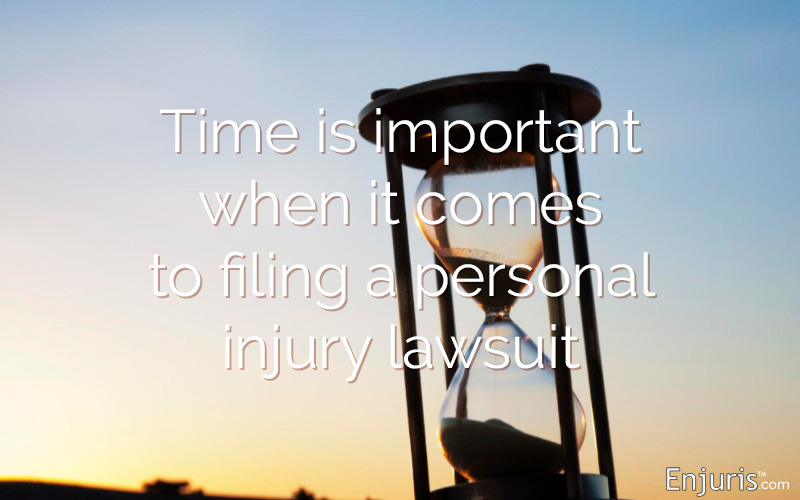Filing too late removes any chance of receiving compensation
When an individual is hurt in a personal injury case, he or she may be focused only on trying to pay medical bills, recover, and move on with his or her life.
Personal injury victims may not be aware that their rights may be affected during the time when they are trying to recover due to specific time limits based on Colorado law referred to as the "statute of limitations."
The statute of limitations provides a deadline by which a personal injury victim must file a lawsuit. If this deadline passes, the victim is barred from ever bringing forth the claim and from being able to receive compensation for the injuries that he or she sustained.
Colorado Statutes of Limitation
| Auto/car accident | 3 years |
| Slip and fall | 2 years |
| Premises liability | 2 years |
| Toxic tort | 2 years |
| Dog bite | 2 years |
| Product liability | 2 years |
| Assault or battery | 2 years |
| Claims against government | 180 days |
| Minors | statute of limitations begins at 18th birthday |
| Wrongful death | 2 years |
| Workers compensation claims | 2 years |
| Medical malpractice | 2 years with discovery rule |
| Libel/slander | 1 year |
| Dram shop (DWI cases) | 1 year |
The applicable statute of limitations is based on the cause of action, the identity of the defendant, and the circumstances surrounding the case.
Reason for statutes of limitation
Each state establishes statutes of limitations for different causes of action. The justification for these laws is so that cases are brought forward in a time when there is reliable information. The witnesses’ memories will be fresher, documents used as evidence will be more readily available, and the events that led to the case will be relatively recent.
Additionally, the courts will hear cases that are based on recent events rather than be flooded with cases alleging events that occurred many years ago. Statutes of limitations also provide greater certainty for defendants who do not have to worry about potential liability for acts committed many years ago.
Personal injury
For slip and fall, premises liability, toxic tort and other personal injury cases involving negligence, the statute of limitations is two years in Colorado.
Automotive/car accident
The statute of limitations is extended to three years if the accident in question was an automotive accident. This includes motorcycle accidents. C.R.S. 13-80-101. However, the statute of limitations on a dram shop case is only 1 year.
Wrongful death claims
When the defendant’s actions result in the death of another, the victim’s estate can pursue a wrongful death claim on his or her behalf. The statute of limitations for these sorts of claims is two years.
However, if it is not discovered that negligence caused the fatal injury until later, the statute of limitations begins once the discovery is made.
Strict liability
In some cases, negligence is not the legal theory alleged. Defendants can be held to a higher standard that does not require the plaintiff to show any negligence on its part (i.e. dog bite cases).
If the circumstances follow the statute’s description, the defendant can be held liable even if the plaintiff does not show that he or she was negligent in any way.
Dog bite cases in Colorado
Colorado uses a combination of negligence and strict liability when looking at injuries from dog bites. The time limit within which action must be brought is two years.
For a comprehensive look at Colorado dog bit injury laws and what you need to know about liablity and negligence, see All Law’s Colorado Dog Bite article.
Products liability
If a person is injured due to the use of a product, he or she has two years in which to file a claim. Product liability claims may be made against any party that is responsible for the product from the manufacturer to the distributor and even the retailer.
Assault or battery
If an injury is based on the intentional tort of assault or battery, the lawsuit must be filed within one year from the date of injury.
Workers’ compensation
For workers’ compensation claims, the plaintiff has two years from the date of injury to file a claim.
Claims against the government
Accidents involving governmental entities in Colorado are associated with a much shorter statute of limitations. The plaintiff only has 180 days from the date of injury to file an administrative claim and submit it to the agency that is responsible.
The claim must be in writing and must provide basic information about the accident including the plaintiff’s name and address, the alleged date of injury, statements regarding the factual basis of the claim, and a request for compensation.
Why filing against the government is different
For the majority of personal injury claims, Colorado’s statute of limitations is 2 years. This means that victims have two years from the date of their accident to file a claim for compensation.
While this is true for filing against another driver, filing against a government entity (whether county, state, or federal) is a different story. If you are filing a personal injury claim against the government, your statute of limitations drops from 2 years to 180 days.
Within those 180 days, you must submit your claim in writing to whichever government agency was responsible for your accident/injuries. You must include your name and address, when the injury occurred, important information and details regarding the injury, statements from witnesses or any doctors that have had a hand in your recovery, and your official request for compensation.
Because of this much stricter time limit, it’s important to establish whether you believe a government entity is involved early on in your personal injury case. Contact a personal injury attorney as soon as possible to avoid complications with the statute of limitations.
When the plaintiff is a minor
If the plaintiff is a minor, he or she cannot sue the defendant until he or she reaches the age of majority, which is 18 years old in Colorado. Therefore, if the victim is a minor, he or she has until the time he or she reaches the age of 18, plus the number of years provided under the statute of limitations.
For a car accident, this would give the plaintiff until his or her 21st birthday to file the lawsuit.
Discovery rule
In most cases, the statute of limitations begins from the date of the injury. In many such cases, the victim is immediately cognizant that he or she has been injured. However, in some cases, the victim may not be aware of sustaining an injury and it may not be reasonable for him or her to know this.
The discovery rule allows the injured party to have longer to bring forth a personal injury claim. Rather than the statute of limitations running from the date of injury, it begins to run when the victim discovers the injury or a date when the injury should have reasonably been discovered.
Tolling
In other situations, there may be times that the victim cannot control circumstances that would prevent the case from moving forward. The time limit of the statute of limitations may temporarily stop until the circumstance no longer exists. This concept is referred to as the “tolling” of the statutes of limitations.
Tolling may occur if the victim is not mentally competent after the injury. If he or she lacks the mental capacity to be cognizant of his or her rights, the statute of limitations may be temporarily stopped until the victim’s competency is restored. Another reason for tolling is if the defendant is bankrupt. In this situation, filling a lawsuit would do no good because there would be nothing to collect from the defendant.
More resources on Colorado time limits and statutes of limitation
The CO Secretary of State web page recommends LexisNexis for the official, up to date version of Colorado Statutes. See also this guide to accessing the statutes.
From Injurylawcolorado.com: How long after an accident do I have to file a claim for injuries and damages resulting from a car accident?
Why should I hire a Colorado personal injury lawyer?
See our guide Choosing a personal injury attorney.


